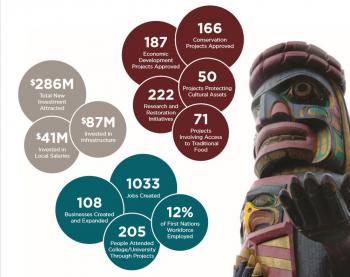Summary
Windspeaker.com Contributor
Brodie Guy is thrilled with the impact Coast Funds has had over the past decade. The funds were negotiated for the First Nations in the Great Bear Rainforest and Haida Gwaii to grow the economy of the region while respecting conservation and Indigenous stewardship.
Legislation was developed that curbed the impacts of industry, such as forestry, mining and other extractive uses. But curtailing exploitation of the territory was just the beginning.
“If you don’t create a pathway to move to something more sustainable, more locally controlled, then you’re going to be restricting people’s ability to prosper,” said Brodie, executive director of Coast Funds.
Coast Funds was created with $120 million from government and industry. The results of the past 10 years of that conservation financing are outlined in the Coast Fund’s newly-released 12-page report.
Conservation financing is a financial mechanism to really support Indigenous peoples to steward their lands in a different way and to invest in their people, said Guy.
The investment has been impressive. More than 353 projects have been approved for $81.6 million with the work attracting $286 million in total investment.
First Nations-led stewardship projects cover a wide range of efforts, from 222 species research and habitat restoration initiatives to 71 projects involving access to traditional foods to 50 projects protecting cultural assets.
More than 1,000 permanent jobs have been created and more than 100 businesses have been expanded or started. Economic development investments have supported ecotourism projects, sustainable aquaculture businesses, and the start-up of First Nations-run economic development corporations.
Getting funding for straight economic development is not as challenging as getting funding for nation-building and social enterprises, says Guy. Coast Funds leaves it up to the communities to determine how best to spend that money.
“Communities (are) really carefully thinking through how are we going to invest this, how are we going to make it successful, not just in terms of profit, but the well-being and social impact in the community,” he said.
“Over the last 10 years First Nations in the Great Bear Rainforest and Haida Gwaii have created a road-map for how we can sustain the most ecologically significant places on the planet while enhancing the well-being of the people who have lived in those places for thousands of years,” said board chair Huux Percy Crosby of the Haida Nation.
Guy has been executive director for the past six years, but he was involved with Coast Funds from the beginning as a partner organization. No one thought the concept would take off the way it did.
“There were high hopes that the idea of empowering First Nations with pretty significant investment… would result in some great things but no one expected it to have the kind of impact after only 10 years that we’re already seeing,” he said.
Because of that success, the Coast Funds model is being embraced internationally. The Indigenous people of the Andes have started Peru’s Natural Legacy, which in May secured $140 million to expand and effectively manage nearly 42 million acres of the Peruvian Amazon.
Bhutan has created a similar fund entitled Gross National Happiness, which aims to balance material gains with social enterprise and environmental sustainability.
There’s no reason, says Guy, that First Nations in northern Alberta can’t employ the Coast Funds model to balance oilsands development with cultural identity and environmental protection.
“It’s a model of empowering local people to chart a course for their future and create a sustainable approach that works within their vision of who they are and their culture and the kind of employment and the way they want to see their community evolve,” he said.
“This model can and must be replicated across the globe,” said Crosby.
Now more than ever, work that Coast Funds allows is important, says Guy.
“There are some really scary things happening on the West Coast and there needs to be better local control. People who know best how to steward and manage their resources and territories need to be at the forefront of these things. So that’s a huge piece of work there,” he said Brodie.

